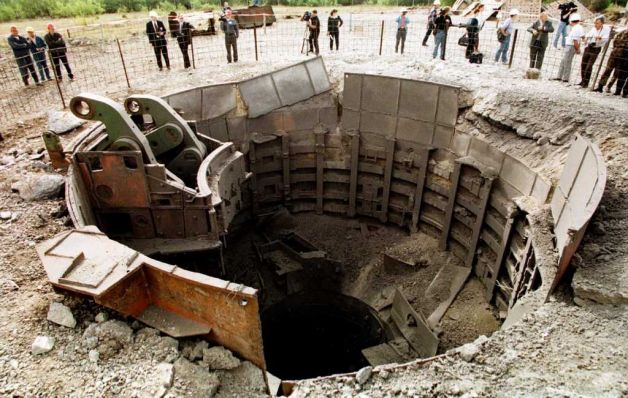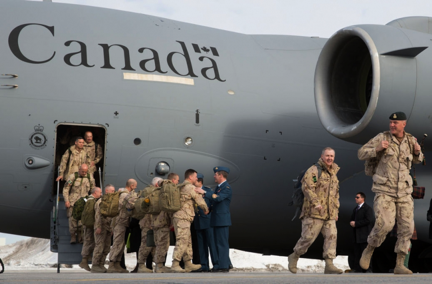In a recent proposal to extend and expand Canadian military operations against ISIS in Iraq, Prime Minister Stephen Harper told the House of Commons that he “will not seek the express consent of the Syrian government” to launch airstrikes on its territory. His announcement was unprecedented. Canada has never before supported armed intervention without the explicit invitation of a victimized state, or without authorization by the UN Security Council or our NATO partners.
Both the New Democratic and Liberal parties indicated their opposition to the proposal, voicing the concern that Canada does not have the legal authority to strike ISIS targets in Syria. Scholars have been similarly critical, arguing that Harper’s expansion of the mission is “built on shaky legal grounds.” The fact of the matter is that international law itself has shaken in the past decade on the issues that Syria presents, and states have forged their own fault lines.
Prime Minister Harper and Defense Minister Jason Kenney repeatedly cite Article 51 of the UN Charter – the right of states to collective or independent self-defense – as the legal basis for the mission’s expansion into Syria. Kenney explained to reporters that the Iraqi government “has asked Canada and allied countries to help them defend their  innocent civilians from terror attacks.” He insists that this request from the Iraqi government requires incursions into Syrian airspace because ISIS has established “a safe haven” in regions that Bashar al-Assad is either unwilling or unable to control.
innocent civilians from terror attacks.” He insists that this request from the Iraqi government requires incursions into Syrian airspace because ISIS has established “a safe haven” in regions that Bashar al-Assad is either unwilling or unable to control.
It is true that Article 51 allows victimized states to request assistance in collective self-defense. However, the Syrian government has not declared itself to be a victimized state, nor has it requested the assistance of the international community to protect its civilians from ISIS. Without the government’s consent to airstrikes on its territory by foreign forces, any such airstrike constitutes a violation of Syrian sovereignty. This is where the legality of expanding Canada’s mission into Syria – even to protect Iraq – can be called into question.
Harper has attempted to reconcile his proposal with international law by arguing that Canada is exercising its individual right to self-defense. He insists that ISIS “[makes] it clear that it targets, by name, Canada and Canadians.” Though this statement is accurate, preemptive self-defense is a precarious area in contemporary international law, and his government is not proceeding with due caution.
The concept of preemptive self-defense refers to the use of force in response to potential, rather than imminent threats to national security. It has been hotly debated since President George W. Bush’s declaration of a global ‘War on Terror’ in the aftermath of 9/11. For nearly fourteen years, the US has been conducting drone strikes against non-state actors by violating the territorial integrity of states like Yemen, Nigeria, Somalia, Libya, Pakistan, and Afghanistan. It has continued despite dubious legal justifications, attempting to reform international law’s definition of self-defense to include preemptive action, ostensibly against militant groups.
By authorizing airstrikes over Syrian territory, Canada is siding with a minority of states – namely the US and Israel – in a decade-long debate on the permissibility of preemptive self-defense. Though shocking, this shift by the Harper government is not entirely unpredictable. Immediately following the invasion of Iraq in 2003, Harper and his colleague Stockwell Day published an opinion editorial in the Wall Street Journal to express their indignation that Canada would not be joining its “key British and American allies.” The purpose of the invasion was to disarm Saddam Hussein and confiscate all weapons of mass destruction in his possession. The failure of the coalition to retrieve any such weapons sparked a heated controversy on the dangers of preemptive action.
The majority opinion of the international community is that collective self-defense should only be exercised in response to armed attacks that are intended by, and attributable to, another state. In the present situation, Syria would have to launch an attack against Canada, or declare itself a victimized state and request assistance to combat ISIS for the government’s proposal to be based on solid legal ground. Both hypotheticals are unlikely, which is why the US has been solely engaged in striking ISIS targets in Syria. It should be considered whether or not Canada has the military might and diplomatic clout to toe the hardline that Harper is treading.
Alternatively, we could explore a different line of argument – one that understands sovereignty as a responsibly, and not an inherent right. Scholars agree that recent developments in international law support this idea. They also note that the primary responsibility of a state is to protect its citizens. Canada could lend legitimacy to a mission expansion with this argument, and to some extent it has already tried. Rather than picking sides in a debate on preemptive action, Defense Minister Kenney explained that Harper is “picking the side of vulnerable minority communities in eastern Syria.” So long as Assad remains unwilling or unable to protect Syrians from ISIS, Canada has legal ground to combat the group in its strongholds in Raqqa and the surrounding region.
The concept of sovereignty as a responsibility is more widely recognized than preemptive self-defense among states and scholars alike, but it suggests that armed intervention in Syria could have happened sooner. Before Assad failed to protect Syrians from the atrocities of ISIS, he actively targeted them with barrel bombs and perhaps, as Human Rights Watch reports, chemical weapons. If Canada wants to play humanitarian to “vulnerable minority communities,” our efforts have been too little, and have come disastrously late.
At home and abroad, Canada can undertake peaceful action to alleviate the suffering of millions of Syrians who have fled to neighboring states or braved a perilous journey across the Mediterranean to seek asylum in Europe. UNHCR spokesperson Melissa Fleming told the press that  ongoing conflict in Syria and Iraq have produced “the worst humanitarian crisis of our era” as the number of people seeking asylum in developed countries has increased by 45% in the last year. Figures have not been this high since the Balkan wars of the 1990s. She encouraged European states to respond as welcomingly now as they did then, and open up their doors. Canada should consider taking this advice as well. Our 2013 pledge to resettle 1300 Syrian refugees was not met until just a few weeks ago – a modest commitment considering the population of Syrian refugees is an estimated 3.8 million.
ongoing conflict in Syria and Iraq have produced “the worst humanitarian crisis of our era” as the number of people seeking asylum in developed countries has increased by 45% in the last year. Figures have not been this high since the Balkan wars of the 1990s. She encouraged European states to respond as welcomingly now as they did then, and open up their doors. Canada should consider taking this advice as well. Our 2013 pledge to resettle 1300 Syrian refugees was not met until just a few weeks ago – a modest commitment considering the population of Syrian refugees is an estimated 3.8 million.
The humanitarian situation is likely to deteriorate as airstrikes are expanded, and insecurity is heightened. Stephen Saideman, Professor of International Affairs at Carleton University, notes that Canadians lack military and intelligence partners on the ground in Syria. This is one of the most significant differences between the operations in Iraq and the proposed mission in Syria. A lack of cooperation from local militants or informants increases the likelihood that civilians will be accidentally targeted, causing more to flee their homes. Canada should be working to mitigate the refugee situation, not foment it.
Observers have speculated that Canada’s mission expansion is accompanied by national political considerations, as well as international ones. Recent polls indicate that Canadians are largely supportive of military actions against ISIS in Iraq. However, opinion polls have not yet asked Canadians whether or not they agree that the anti-ISIS mission should be expanded into Syria. The unknown status of public opinion on this issue, combined with its uncertain status in international law, demands cautious consideration, not reckless action.




